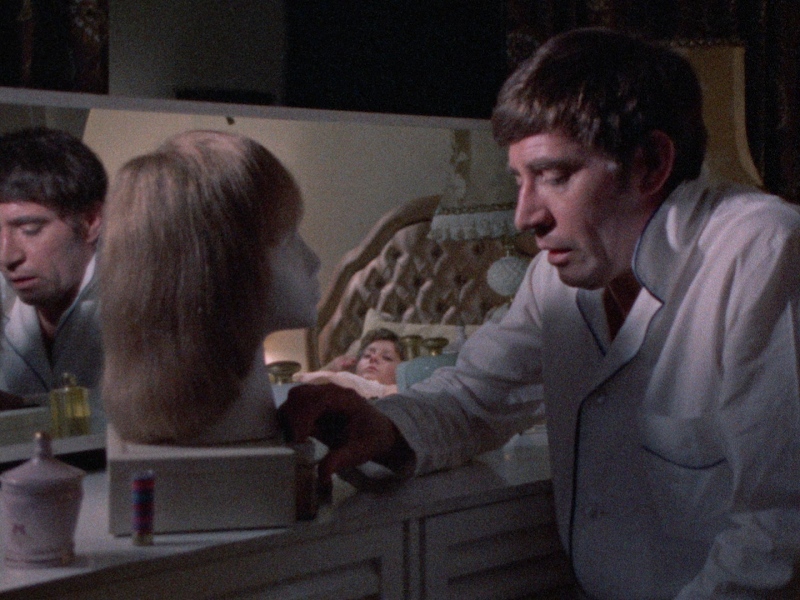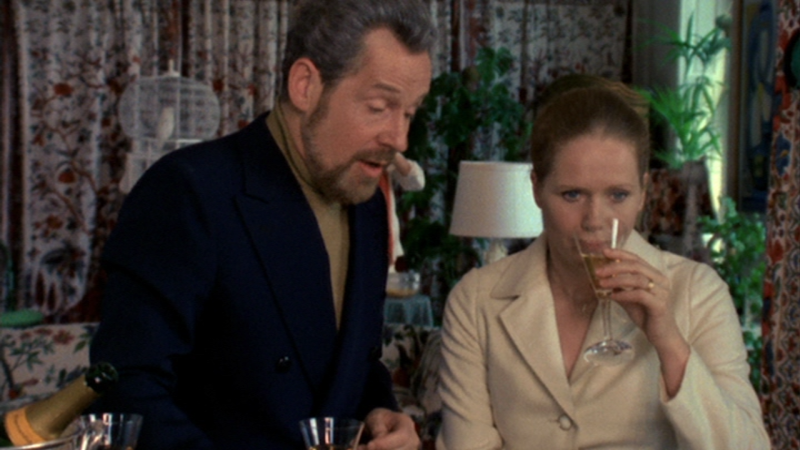Update 8/14/24: Thanks to Australia's Imprint label, there's now a special edition in town! And since it's Update Week, I've also updated a couple older posts today, specifically A Child Is Waiting and A Rainy Day In New York with additional DVD versions. And it's just Day 2, so we're just getting started!
This opening screenshot should give you an idea of what I'm talking about; our protagonists have landed on the surface of Mars and exited their spacecraft without spacesuits or any other method to address the atmosphere. They just describe the air as "thin." The Martian Chronicles was broadcast in 1980, but it's based on Ray Bradbury's 1950 novel of the same name, and much of is gathered from short stories first published in the 1940s. So there's a lot of rough, early (mis)understandings of science in the material that the series' adapter Richard Matheston, himself a great science fiction writer, opted not to alter/ update for more modern viewers. It's also surprisingly sexist (in an abandoned city, a man searching for a lone female survivor not only asks himself, "if I was a woman, where would I be? Hmm... The beauty parlor!" but he turns out to be correct; the author agrees with the character). These films are faithful, perhaps to a fault; but having made a study of it now, I completely concur with Matheson's decisions here. I daresay, he's crafted these films even better than Bradbury would have himself.
So just to clarify, The Martian Chronicles is based on a series of short stories Bradbury had written about man's explorations and colonization of Mars. The stories were compiled and altered, with many new additions, to shape it into what is essentially still an anthology, with different characters set in their individual plots, but which push a larger narrative of mankind's advancement, or failings. Matheson's own talents come into play, then, as he very intelligently walks a fine line between anthology and a single narrative. Characters come and go, their stories begin and end in a sometimes episodic way, but they all contribute to this one over-arching adventure, which winds up being more meaningful and impactful than the sum of its parts. It's not about spectacle, although for a television production it's very ambitious and there are a bunch of cool visuals. It has an impressive all-star cast, including Rock Hudson, Roddy McDowall, Bernie Casie (who's awesome in this), Demon Seed's Fritz Weaver, Bernadette Peters (albeit not in the most flattering role) and Darren McGavin. Yes, the martians themselves tend to look like some of the cheesier aliens you'd see on Star Trek, but there's also some really cool and inventive production design. And the theme music is cool in a very early 80's way. But what's really important is just that this is really a great, classic science fiction story, expertly told, with a lot to say that still stands the test of time.
The Martian Chronicles debuted on DVD from MGM as a 3-disc set in 2004, though there had previously been a 1999 laserdisc set from Image and a series of different VHS releases in its day. The DVDs were really the way to go, though, until 2018, when Kino treated us to a 2-disc blu-ray upgrade. Then in 2023, while the the transfers were the same, Imprint came with a bunch of new features on their new 2-disc BD set, which turned it into a proper special edition.
 |
| 2004 MGM DVD top; 2018 Kino BD mid; 2023 Imrpint BD bottom. |
All three sets offer the original mono track, but the BDs have bumped it up to lossless DTS-HD. All three also include optional English subtitles, though only the MGM also comes with optional French and Spanish subs.
As I said, though, MGM's release was completely barebones. Kino's set is no packed special edition, but we got a little something. Specifically, we got a very brief, but fun and insightful, on-camera interview with actor James Faulkner. He talks about his experiences playing a martian, but unfortunately, he's unable to speak to so many of the broader topics that Martian Chronicles fans would like to know, about the history of the novel, how it differs from the show, how the show came to be produced, etc. That's no fault of Mr. Faulkner's, of course - and I also appreciate that most of the key players: Matheson, Bradbury, Hudson, etc have passed, so they'd be limited as to who else they could interview - but even just an expert's participation would have been very welcome. Still, this is a good, if small, step forward. There's also a couple bonus trailers and reversible artwork (using the same imagery as the MGM cover).
Now, where Imprint breaks away from the pack is the impressive collection of extras. First we have an audio commentary for all three films by expert Gary Gerani, and they're pretty great. He's really well informed and delves deep into the differences between this and the book, and knows plenty about other versions as well. It does start to feel like he's filibustering a bit in the third chapter to fill time, but for the most part, he's a great addition, and if you own this set, you should definitely check him out. Then, there are three new, on-camera interviews with the special effects artist, composer and sculptor. They're all pretty great, though some memories are a bit disappointingly faded and vacation-focused (you'll see what I mean). And there's also a pretty great, vintage made-for-TV documentary about Ray Bradbury, which really rounds out the package. Imprint's release also comes in a fancy slip-box with a cool lenticular cover.
 |
| The same moment in The Martian Chronicles and Ray Bradbury Theater. |
The others are alternate takes on chapters that were in the films; and honestly they're quite good and fun alternate takes on the material, with some noteworthy cast members like John Vernon, David Carradine and Patrick Macnee. As stand-alone episodes without the macro-narrative, though, they feel more like Twilight Zone episodes: clever stories leading up to an amusing twist, but without the dramatic weight or substantive heft of the films. Bradbury has taken the opportunity to update them - they wear spacesuits and female characters have actual utility. And there are some clever details here that Matheson omitted. And the other episodes in the series are fun, too. Having recently rewatched the complete Tales From the Darkside, I'd say this series is generally better written with higher production values. So if you liked that, you're sure to dig this.
 |
| 2018 Kino BD top; 2005 Echo Bridge DVD bottom. Same scene. |
So yeah, if your idea of science fiction is the latest special effects and blockbuster actions, admittedly, you're going to be disappointed in The Martian Chronicles. But if you prefer headier stuff and can look past superficial imperfections, The Martian Chronicles is actually pretty terrific. And the Imprint blu really delivers a satisfying package (though it's too bad they couldn't license that little Faulkner interview, too). And then I'd also recommend anyone who does come to love the films to check out the Ray Bradbury Theater episodes as excellent supplements. But they're not the same tier works of art that the films are.












































